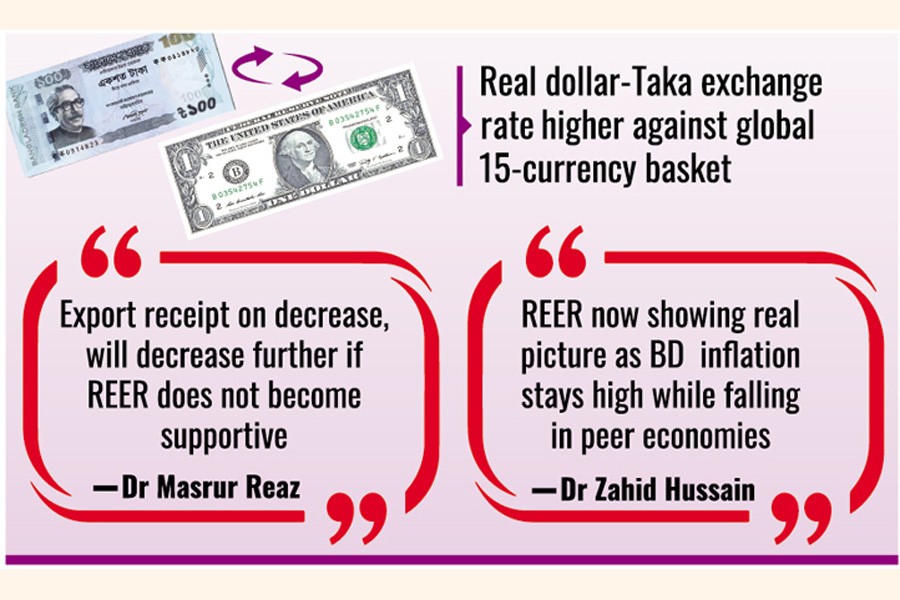
Published :
Updated :

A stubbornly high inflation in Bangladesh is pushing up the real effective exchange rate or REER and thereby eroding fast the competitiveness of its export-earning sectors against peer countries, businesses say.
The REER index increased from 104.42 in August 2023 to 106.10 in September, going up from 100.
The index upswing indicates some loss of competitiveness in international trade compared to the previous month, as local prices are higher relative to the price indices in trading partners, according to Bangladesh Bank's narrative.
Bangladesh's CPI inflation soared to 9.92 (overall) in August amid soaring food costs, the Bangladesh Bureau of Statistics said. However, it was slightly down to 9.63 per cent in overall count in September.
The REER appeared to be settling near its fair value at 100 after its real effective exchange rate against a 15-currency basket of global trading partners dropped significantly during the December 2022-January 2023 period.
The value of REER, measured by the central bank of Bangladesh against the currency basket, is in fair strand at 100 in comparative assessment with the currencies in the trading-currency basket.
"Steep inflation persisting in Bangladeshis is believed to be the main reason as the price surges in its trading partners have eased," says one economist, and exporters agree.
Among Bangladesh's top trading partners are mainly China, the EU, and India. The REER considers the currencies and inflation readings of the top 15 trading partners.
"When we talk about export-competitiveness, many economists used to say the overvalued local money impacts the international trade. It went down but inflation pushed it up again," said one of the bankers, who was involved with preparing the index.
The REER had dropped during the first few months of 2023 as there was a huge depreciation of the local currency against the US dollar and the inflation was a bit lower at around 9.0 per cent. The inflation started picking up in the February-March period.
The exchange rate of the Bangladesh Taka, against the USD, depreciated by 1.94 per cent during July-September of the current fiscal year compared to the depreciation by 5.93 percent during July-September in FY23, according to Bangladesh Bank
Economists say this higher REER will hit the country's export-earning sectors.
Bangladesh's export-receipt growth was less than 4.0 per cent in August last to US$4.78 billion, EPB data show.
"Definitely, this will impact the competitiveness at a time when the global demand for clothing is fading out fast," says Dr M. Masrur Reaz, chairman of the local think-tank Policy Exchange of Bangladesh.
He notes that the country's export receipt is now on the decrease and will decrease further if the REER does not become supportive.
Dr Zahid Hussain, the former lead economist of the World Bank at its Dhaka office, feels that "the REER picture is now showing the real picture as inflation in Bangladesh remained high while inflation in its peer economies is falling".
The local currency, Taka, is now more or less stable after high devaluation before August last, he told the FE.
Bangladesh Bank sold a net amount of US$ 3.17 billion on the foreign-exchange market during the July-September quarter of the FY24, compared to a net sale of USD3.56 billion during July-September FY23, to contain volatility on the forex market amid scrambles for dollar because of short supply through proper channels.
He said inflation remained upward since February and in peer nations the inflation started to fall.
In the meantime, central bankers said that new exchange regime started in July last to contain the persistent higher inflation. But it will take time to transmit into the economy.
Exporters say that the local currency is not fairly valued and their products in the trading partners' economies are getting expensive.
"We have now two-edged problems, one is poor buy-orders, and the other is technically known REER," says Anwar Ul Alam Chowdhury Perves, managing director of Evince Group, a leading RMG maker.
He feels that the nominal exchange rate should be more competitive to reduce the REER.
"And inflation should be contained," the leading exporter suggests.
jasimharoon@yahoo.com


 For all latest news, follow The Financial Express Google News channel.
For all latest news, follow The Financial Express Google News channel.